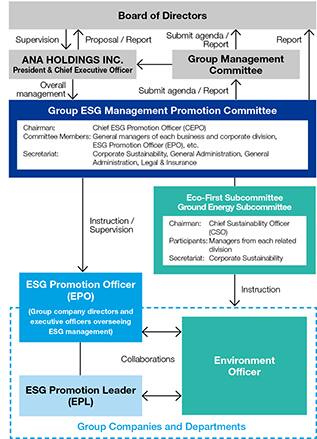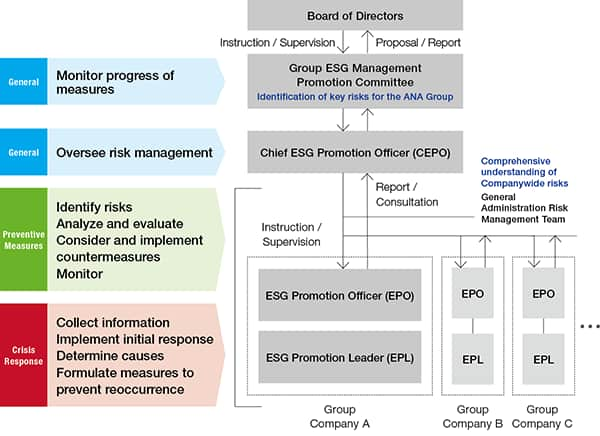Biodiversity
Basic Approach
The ANA Group has established the "ANA Group Environmental Policy" and "ANA Group Biodiversity Policy" and considers the achievement of environmental targets and biodiversity conservation as material issues in resolving environmental concerns. In March 2018, as the first Japanese airline to sign the "Buckingham Palace Declaration" aimed at eradicating illegal wildlife trade recommended by IATA, the Group has been strengthening border measures in our transportation business, such as preventing the transportation of invasive species and providing transportation with consideration for the protection of endangered species. We are actively promoting initiatives to protect biodiversity by strengthening border measures within our transportation business.
The Kunming-Montreal Global Biodiversity Framework (GBF*), which includes four goals and 23 targets to be achieved by 2030, was adopted in December 2022. The ANA Group will specifically address the following targets.
- Global Biodiversity Framework
- Target 3: Ensure and enable that by 2030 at least 30 % of terrestrial, inland water, and coastal and marine areas, are effectively conserved and managed
- Target 5: Ensure that the use, harvesting and trade of wild species are sustainable, safe and legal
- Target 8: Minimize the impact of climate change on biodiversity through mitigation, adaptation, and disaster risk reduction actions
- Target 16: Halve global food waste, significantly reduce overconsumption and substantially reduce waste generation
ANA Group Biodiversity Policy
The ANA Group considers the achievement of environmental targets to solve environmental issues and the conservation of biodiversity as important management issues.
In July 2023, the ANA Group established the ANA Group Biodiversity Policy, which the Board approved by the Directors.
This policy applies to all value chains involved in the ANA Group's business activities.Based on this policy, the ANA Group is committed to avoiding or minimizing negative impacts on the natural environment and human rights through not only its business activities, but also through collaboration with suppliers and lobbying to related organizations, to conserve and restore the natural environment 'Nature Positive', and to provide sustainable services to our customers.
- The ANA Group will evaluate the impact and dependence of its business activities on biodiversity, taking into account the unique characteristics of each region, and disclose this information to society. We will also proactively communicate our Nature Positive initiatives and continuously strive to improve our efforts.
- We will comply with the United for Wildlife Transport Taskforce Buckingham Palace Declaration, which aims to eradicate the illegal wildlife trade. We will also work diligently to prevent the illegal trade of wildlife through air transport and ensure that air transport does not serve as pathways for invasive species that threaten ecosystems, habitats, and species. We will ensure that endangered species listed in the Convention on International Trade in Endangered Species of Wild Fauna and Flora (CITES) are not utilized in flight-related services, raw materials, or in-flight service items.
- Aiming to achieve No Deforestation within our supply chain, we will refrain from sourcing goods from suppliers that cause biodiversity loss or deforestation.
- We will promote measures to minimize negative impacts on biodiversity by reducing our environmental footprint and mitigating climate change.
- Our measures also include the preservation of ecosystems and the prevention of deforestation by minimizing food waste and paper consumption.
- We will raise awareness of biodiversity conservation and encourage employee participation in biodiversity conservation activities through education to all our officers and employees.
- In addition to group companies collaborating with business partners and suppliers to conserve biodiversity in the course of their business activities, we will actively promote initiatives in partnership with external stakeholders such as governments, local communities, and international NGOs and NPOs.
- The Policy has been approved by the Board of Directors in July 2023.
This policy applies to all value chains involved in the ANA Group's business activities.
Disclosures Based on TNFD Recommendations
Governance
As for nature-related issues including biodiversity-related dependencies, impacts, risks and opportunities, we are dealing with these issues under our ESG management implementation structure. Specifically, we have the ANA Group ESG Management Promotion Committee, which operates under the guidance of the president of ANA HOLDINGS and under the chairmanship of the director in charge of Group Risk and Compliance (Chief ESG Promotion Officer: CEPO). This committee consists of directors and executive officers of ANA HOLDINGS and ANA Group companies and the full-time Audit & Supervisory Board Members of ANA HOLDINGS. The committee discusses and decides on the Group's core policies and measures related to environmental issues, including those concerning climate change and biodiversity, and monitors the progress made with the targets set for these issues on a quarterly basis. The Board of Directors sets the entire Group's management policies and targets while overseeing the management and business execution of each Group company.
We also express our commitment to addressing climate change- and biodiversity-related issues in the ANA Group Procurement Policy.
The ANA Group Procurement Policy is comprised of the Basic Procurement Policy and the Supplier Code of Conduct and was formulated in reference to the United Nations Guiding Principles on Business and Human Rights, the International Bill of Human Rights (the Universal Declaration of Human Rights) and other international norms concerning human rights and labor. We select suppliers based on the Procurement Policy and conduct regular monitoring of them while proactively working to gain their understanding and cooperation with regard to the related issues.
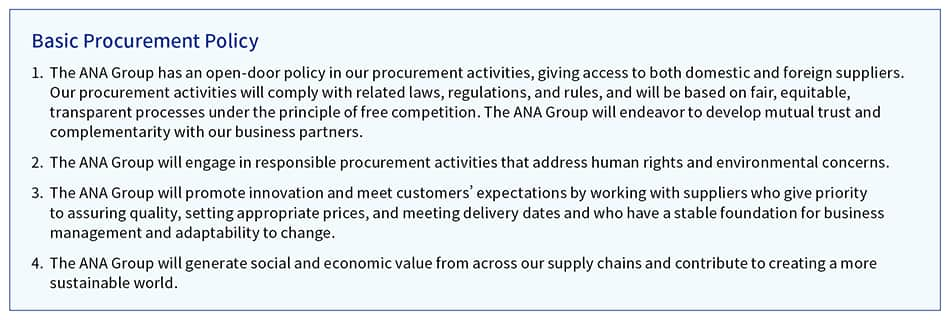
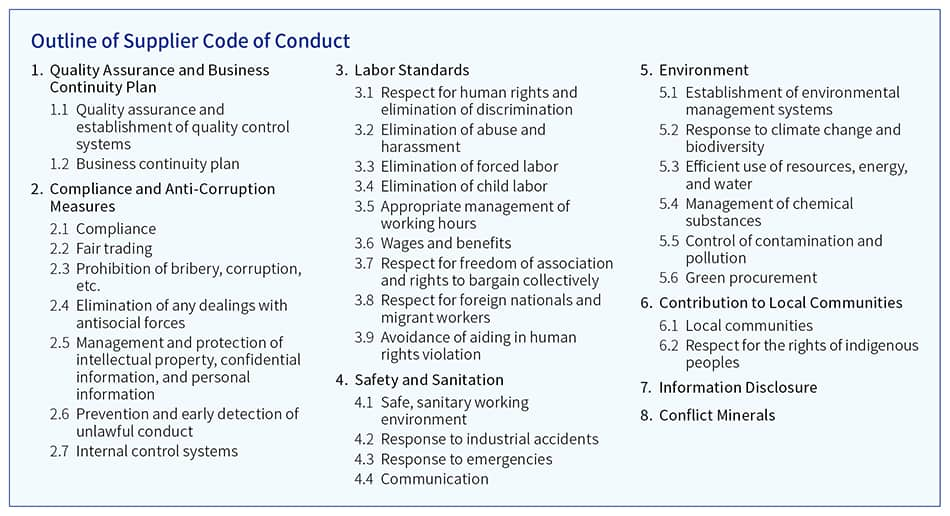
Further, in order to promote measures for responsible procurement, we have appointed procurement managers at the departmental level and are working with our suppliers to achieve a sustainable society.
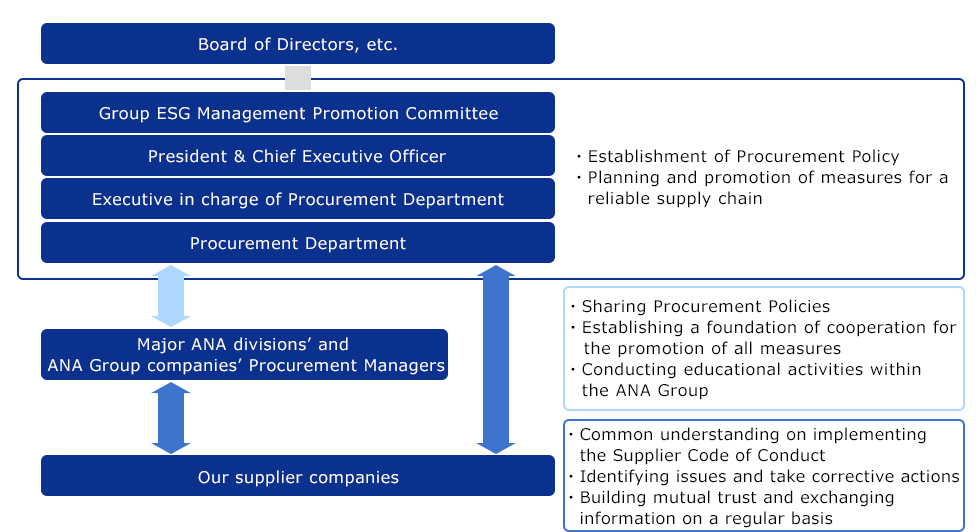
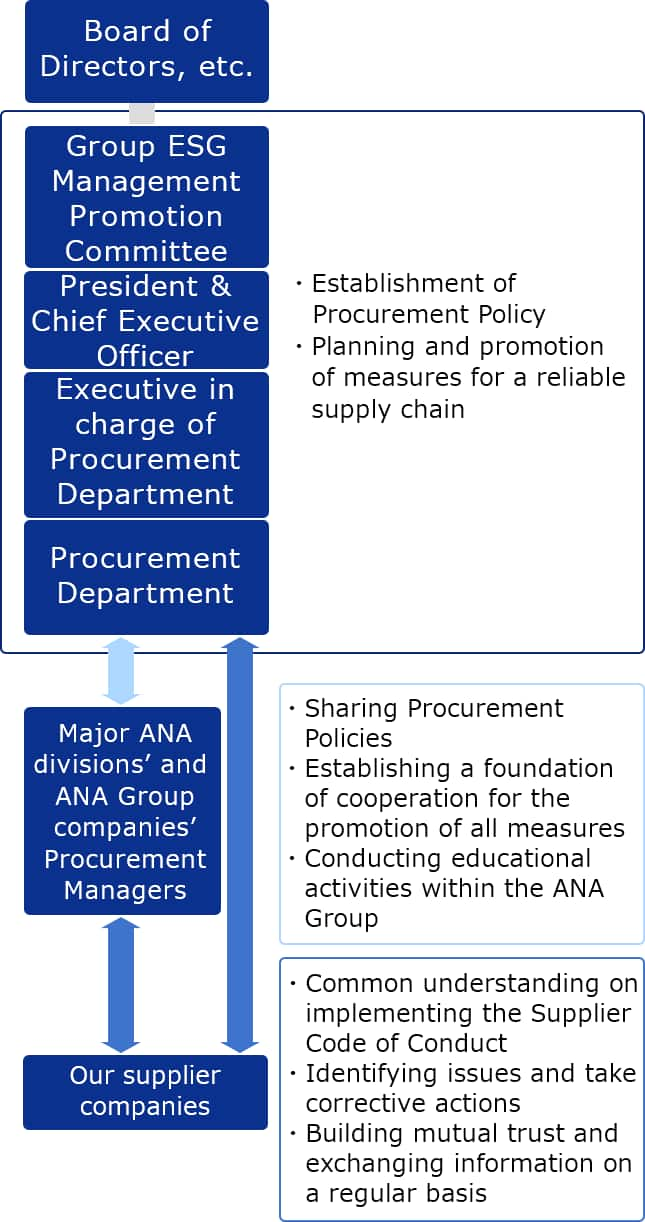
Strategy
Overview of disclosures, and related measures
The TNFD recommendations include a suggestion to "identify priority locations" for the analysis of nature-related dependencies and impacts in business. Having already identified nature-related dependencies and impacts across the ANA Group's business, going forward we will work to "identify priority locations" in line with the TNFD recommendations with regard to nature-related dependencies, impacts, risks and opportunities in the upstream and downstream value chains as well as in our direct operations, for which we have obtained relevant data.
Overview of dependencies and impacts
The ANA Group depends on the activities of nature ("ecosystem services") in various ways. For example, the stable operation of aircraft depends on a stable climate ("regulating services"). For materials used to produce sustainable aviation fuel (SAF) and the foodstuffs used in our inflight meals, we depend directly on products of nature ("provisioning services"). Further, for some of our flight routes and regional revitalization business, we depend on the tourism resources produced by local biodiversity and local recreational and aesthetic functions ("cultural services").
In addition to depending on nature's gifts, the ANA Group can also impact nature in the course of conducting its business activities. For example, we may impact local ecosystems due to CO2 emissions from the operation of aircraft; noise and light emanating from aircraft and airports; disposal of food and plastic & paper materials; and non-intentional contribution to the trafficking of wildlife and the migration and spread of invasive alien species.
Overview of risks
The ANA Group's dependencies and impacts on nature could pose various risks to its business continuity. These risks include the inability to procure SAF, carbon credits or foodstuffs for inflight meals; cost increases due to enhanced regulations on pollutants; lower sales due to a decrease in nature tourism in connection with the loss of biodiversity; reputational risk posed by an inability to implement adequate countermeasures against the trafficking of invasive alien species and wildlife; and divestments caused by an inability to give due consideration to the environment regarding the use and discharge of water.
Overview of opportunities
We also analyzed the nature-related opportunities available to the ANA Group.
In TNFD recommendations, nature-related opportunities are categorized into sustainability performance-related opportunities for the restoration of nature and "business performance" opportunities for the promotion of business.
With regard to opportunities for the restoration of nature, the ANA Group has held seminars to eradicate wildlife trafficking, an activity to remove invasive alien species such as Mikania micrantha (tsuruhiyodori or mile-a-minute) in Okinawa, an activity to plant coral seedlings under the leadership of Team Tyura Sango, and a project to protect the future of mandarin orange orchards in Ehime.
For business performance-related opportunities, we will make even more efforts to maximize sales from our flight routes by continuing to plan and implement sustainable tourism that contributes to local communities and creates new demand.
Responses
For the nature-related disclosure, we have summarized our existing responses to the specified nature-related dependencies, impacts, risks and opportunities.
Going forward, we will rate the importance of the nature-related dependencies, impacts, risks and opportunities thus identified and then examine measures to enhance our responses to the issues of particular importance while making effective use of the AR3T Framework* and others.
- Action framework created based on the SBTs for Nature and comprising four stages to be followed by companies: Avoid, Reduce, Restore & Regenerate and Transform.
Dependency and Impact, Risk and Opportunity Analysis
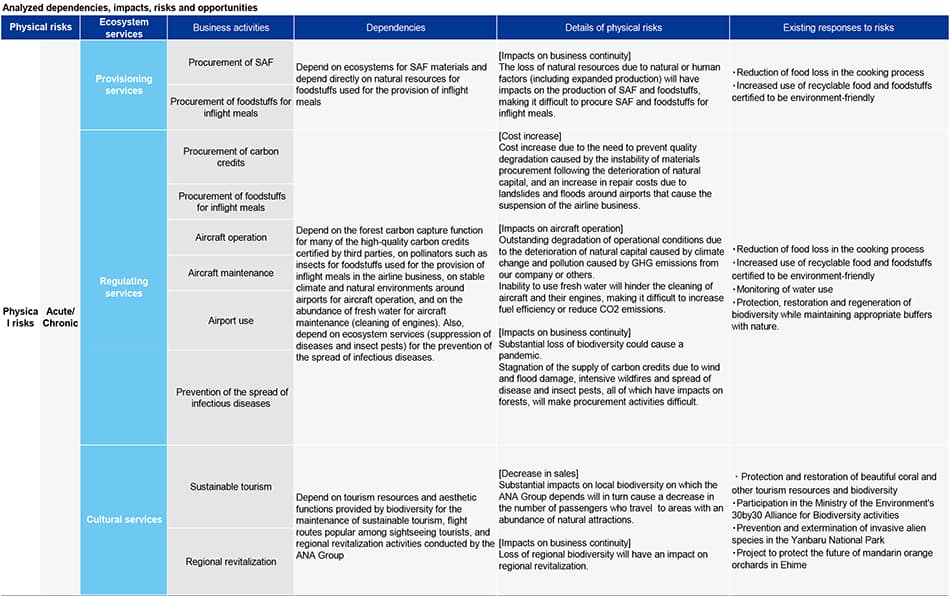
Chart:Dependence on and impact on natural capital and biodiversity, risks and opportunitiesPDF Opens in a new window.In the case of an external site,it may or may not meet accessibility guidelines.
Risk & impact management
For the ANA Group's dependencies and impacts on nature in its business activities, we have identified both direct and indirect dependencies and impacts by making comprehensive use of the insights gained from the following: recognition of related issues by the International Air Transportation Association (IATA); dialogue with an external expert (ERM Japan), and the results of analysis made by using the "ENCORE"* dependencies and impacts analysis tool.
We then discussed the related issues with Group companies and related departments for the analysis of our nature-related dependencies, impacts, risks and opportunities.
- ENCORE: a free online tool to help businesses and financial institutions in the early stages of understanding their nature-related dependencies and impacts
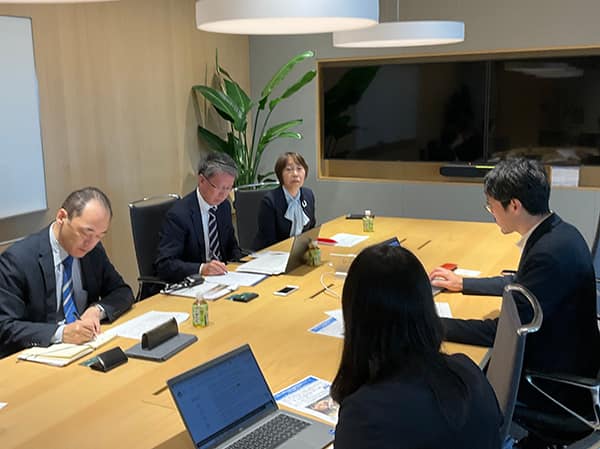
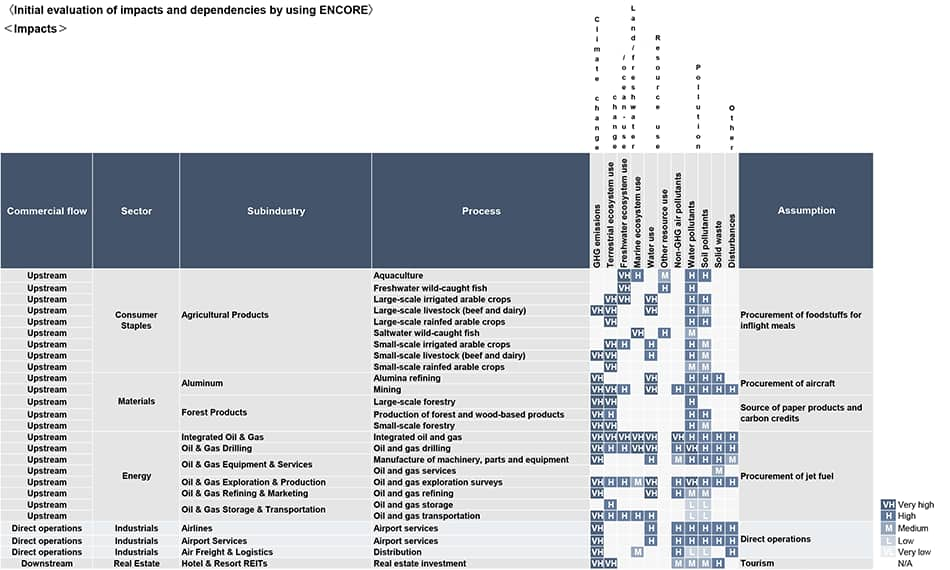
Chart:Initial assessment of impact and dependence by ENCOREPDF Opens in a new window.In the case of an external site,it may or may not meet accessibility guidelines.
Nature-related risk management process
Based on the ANA Group Environmental Policy and the ANA Group Biodiversity Policy reported to the Board of Directors, and in line with the ANA Group Total Risk Management Regulations setting out the basic terms of the Group's risk management, the ANA Group ESG Management Promotion Committee formulates and proposes basic policies and monitors progress. We regard nature-related risks as important risks and deal with them under our total risk management system.
At each Group company and each department, an ESG Promotion Officer (EPO) and ESG Promotion Leader (EPL) are respectively working as the person responsible for promoting ESG management and the person tasked with leading ESG activities under the risk management system. The EPL implements risk management (and prevention) measures in a planned manner and makes prompt responses in cooperation with the secretariat in charge in the event of the materialization of any risk.
Metrics and targets
The ANA Group is committed to mitigating the impact that it causes to biodiversity in its business activities and will strive for biodiversity conservation through its business activities and social contribution activities. As for the TNFD core global disclosure metrics to manage nature-related dependencies, impacts, risks and opportunities, we are planning to analyze and disclose them based on their respective importance for the ANA Group. SAF:*Sustainable Aviation Fuel
| ANA Group Environmental Targets | FY2030 | FY2050 | |
|---|---|---|---|
| 1 | Reduce CO2 emissions | Reduce 10% or more compared to FY2019 levels Replace jet fuel to SAF* by 10% or over |
Net zero |
| 2 | Reduce Resource Waste Ratio (Plastics, Paper, etc.) |
70%+ reduction (waste generated vs. FY2019) |
Zero waste ratio |
| 3 | Reduce Food Waste Ratio (Including In-Flight Meals, etc.) |
Reduce to less than 3.8% waste ratio | Less than 2.3% |
| 4 | Illegal Wildlife Trade | One or more seminars | One or more seminars |
- Reduction of CO2 emissions mitigates climate change and protects living organisms from disasters. We will reduce CO2 emissions by replacing at least 10% of consumed fuels with SAF by 2030, and by converting almost all fuels to low carbon by 2050. We will avoid impact on biodiversity by purchasing SAF made from raw materials certified by EU and ICAO CORSIA that have minimum negative effects on biodiversity and food production. We will also utilize high-quality carbon offsets that not only address climate change but also contribute to the conservation and enhancement of biodiversity.
- Reducing the use of paper resources will also help to halt deforestation, protect the forests that produce oxygen, and conserve the ecosystems that inhabit them. As from May 2020, the ANA Group has introduced paper straws made of Forest Stewardship Council (FSC) certified materials. In addition, starting in April 2020, we have replaced plastic cutlery with FSC certified wooden cutlery, which will reduce the use of disposable plastic by approximately 6 tons, based on our actual use in fiscal year 2019.
- To reduce food loss from in-flight meals, we will recycle food waste as fertilizer to reduce the overall waste. We will decrease the degradation of biodiversity through No Deforestation and land use by reducing the application of chemical pesticides and fertilizers.
- We will strive to maintain and restore biodiversity through the achievement of our environmental goals and will conduct educational activities aimed at eradicating illegal wildlife trade in air transportation.
Measures implemented through business activities
| Avoid, Reduce | Reduce, Restore & Regenerate | Restore & Regenerate |
|---|---|---|
|
1. Organizing Seminars to Eradicate Wildlife Trafficking
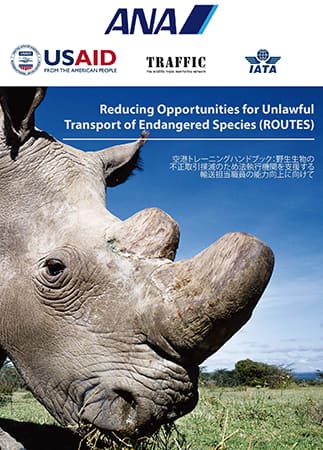 2. Use of SAF
|
3. ANA Group and Sojitz Pla-Net launch recycling operation to reduce the disposal of plastic waste
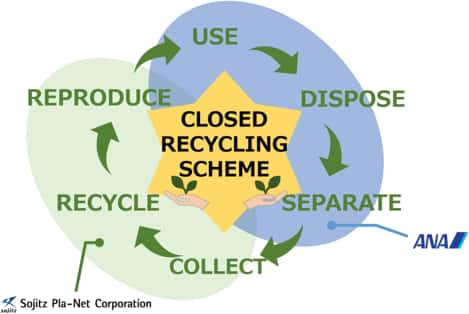 4. Circulating Mechanisms for Food Residues
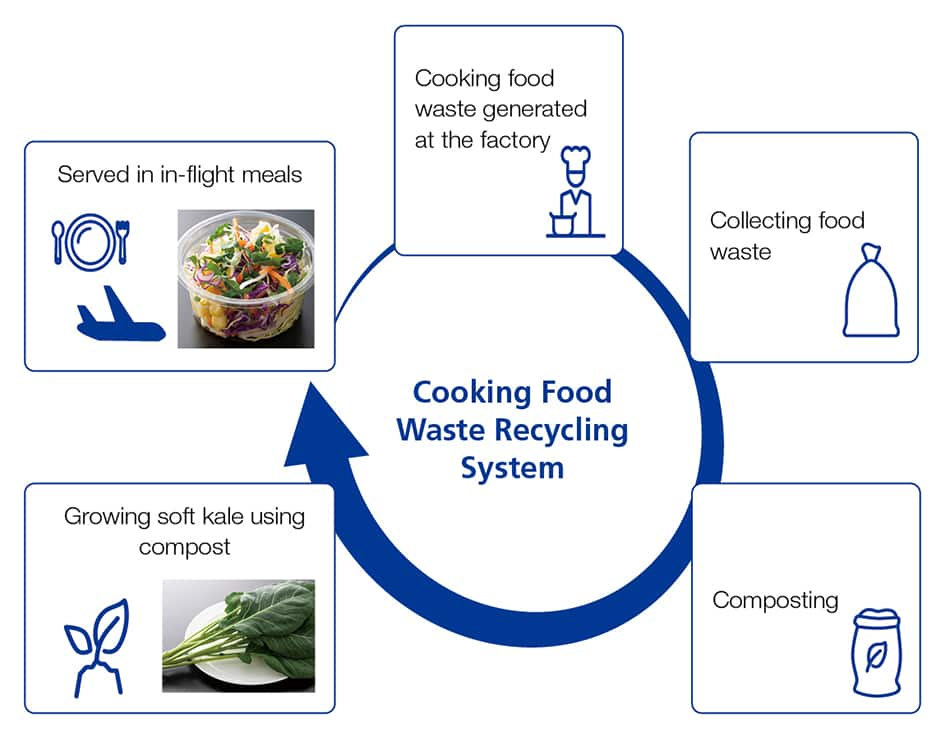 |
5. Restoration of Mandarin Orange Orchard in Ehime prefecture and Green Tourism promotion
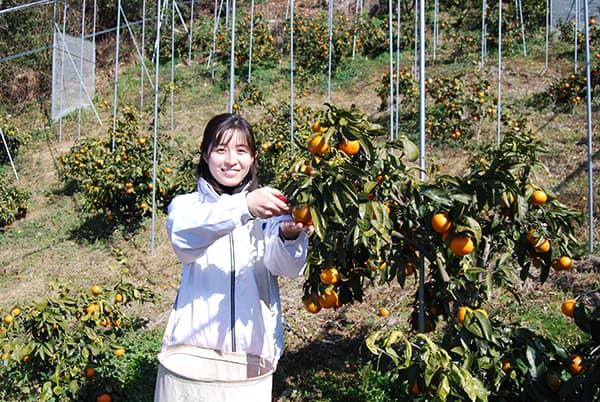 |
Collaboration with Stakeholders

Participation in the TNFD Forum
Through its participation in the TNFD Forum, the ANA Group is working to deepen its knowledge of the international framework for the disclosure of natural capital-related information and to enhance its information disclosure.

Adoption of disclosures in line with the TNFD recommendations
In December 2023, the ANA Group have signalled intent to adopt the TNFD (Taskforce on Nature-related Financial Disclosures) Recommendations.
We will promote nature-related disclosure in line with the TNFD framework.

Participation in the "30by30" Alliance for Biodiversity launched by the Ministry of the Environment
We support the "30 by 30" targets, which aims to effectively conserve at least 30% of the land and oceans as healthy ecosystems by 2030, now sits as "target 3" of the Kunming-Montreal Global Biodiversity Framework, adopted at COP15.
The "30by30" Alliance for Biodiversity (Japanese only) Opens in a new window.In the case of an external site,it may or may not meet accessibility guidelines.
English Outline of Japan's 30 by 30 Roadmap Opens in a new window.In the case of an external site,it may or may not meet accessibility guidelines.
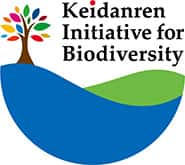
Endorsement of the Keidanren Declaration of Biodiversity and Action Guidelines
Since 2016, we have participated in the Keidanren Council for Nature Conservation as a standing committee member company and endorse the Keidanren Biodiversity Declaration Initiative.
Keidanren Initiative for Biodiversity Conservation Opens in a new window.In the case of an external site,it may or may not meet accessibility guidelines.

WWF Corporate Member
As a corporate member of WWF Japan since 2022, we support WWF's environmental conservation activities.
WWF JAPAN Opens in a new window.In the case of an external site,it may or may not meet accessibility guidelines.
| Reduce Restore Regenerate |
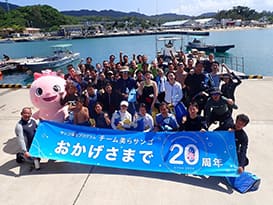 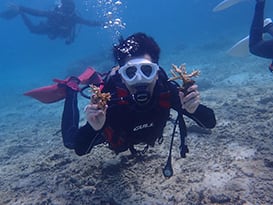 |
Coral conservation in Onna village, Okinawa prefecture (since2004) Under the auspices of the Ministry of the Environment, Okinawa Prefecture, and Onna Village, and with the cooperation of the Onna Village Fisheries Cooperative Association, we have held coral seedling planting programs and educational events in and outside Okinawa Prefecture.The program, which began in 2004, will celebrate its 20th anniversary in 2024, with 16 member companies.We aim to protect coral from the bleaching phenomenon caused by rising sea water temperatures, feeding damage caused by massive outbreaks of crown-of-thorns starfish, and pollution caused by red soil runoff, thereby preserving the marine ecosystem.By 2023, 4,433 people had participated and planted 19,439 corals. |
|---|---|---|
| Reduce Restore Regenerate |
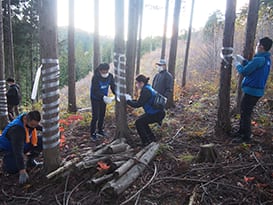 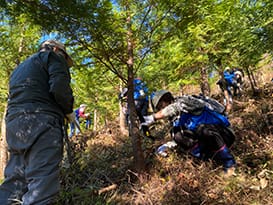 |
ANA Kokoro-no-Mori Project (since 2012) With the aim of supporting the reconstruction of Minamisanriku Town and the preservation of local forests, we not only plant trees, but also work to protect the living organisms that inhabit them and preserve the ecosystem through appropriate thinning and forest road maintenance. Wood from forest thinning is commercialized and sold at a local factory, which also provides employment for those responsible for forest maintenance and product production. In 2020, the company will be presented with an FSC-certified (Forest Stewardship Council®) model aircraft, and it is engaged in activities while deepening exchanges with local residents. |
| Reduce Restore Regenerate |
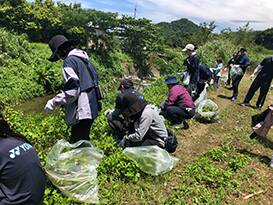 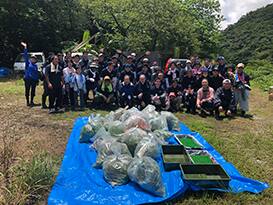 |
Prevention and Extermination of Invasive Species in "Yambaru National Park" (since 2017) In cooperation with the Ministry of the Environment and Kunigami County, employee volunteers conduct emergency measures to control invasive alien species (Tsuruhiyodori and Nagaetsunogeitou) in the Tagari area of Ogimi Village, an area adjacent to "Yanbaru National Park.Through the control work, under the guidance of rangers from the Ministry of the Environment, we aim to conserve native plants and ecosystems that are declining due to the proliferation of non-native species. |
